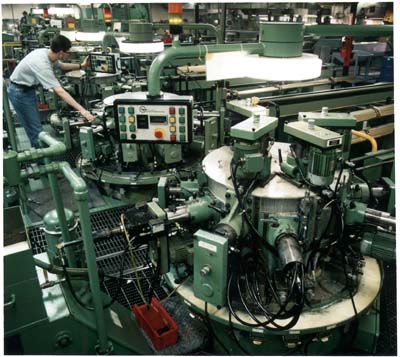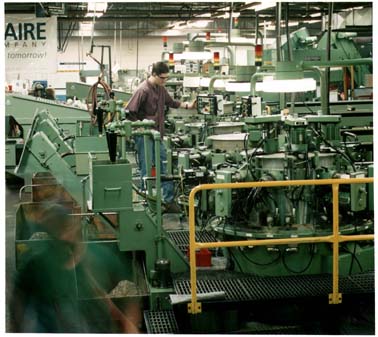Tennessee Valvemaker Keeps Things Hot with Hydromat Technology
Lincoln Brass cools competition with a bank of rotary transfer machines.
David Sharpe, manufacturing manager, Lincoln Brass (Waynesboro, TN) describes valvemaking for outdoor gas grills, fireplaces, and "white goods" such as residential and commercial stoves and ranges as "very competitive." And competition is coming not only from two or three major domestic valvemakers, but increasingly from "South of the Border" and from as far away as the Pacific Rim and China.
Sharpe believes that the nature of competition is changing. A customer may want to pay a dollar for a Lincoln Brass valve, but he'll expect two dollars worth of quality in the valve.
"When you make millions of valves and fittings a year and want to keep a leadership position, you must demonstrate, valve by valve, the highest quality and value/cost ratio," says Sharpe. "Customers are still going to shop around on price, but more and more, this also means shopping around on quality for the price. Buying a cheaper valve that won't last as long or fit right or operate properly—that doesn't sit well with customers."
Putting rotary transfer machines to work
Until 1991 or 1992, Lincoln Brass turned out valves and fittings primarily on screw machines and a battery of other machines for secondary drilling, milling, threading, finishing and so on. A typical scenario, Sharpe says, would be blanking out a part on a screw machine and then sending it through two to ten secondary operations for completion. Then, these parts were taken to assembly for valve completion.

"It was pretty difficult to manage keeping track of what parts were at what stages in a given process. Changing over could take literally days—not that it takes that long to change-over a screw machine, but when you factor in all the various secondary machines, you often were looking at days," Sharpe remembers.
Machining in a single setup
With a stable of Hydromat rotary transfer machines producing the parts, Sharpe reports all that has changed. Parts that used to take two to ten steps now are down to a single machine setup. The effects on productivity, WIP, inventory, setup and part changeover have been dramatic.
"Parts made this afternoon will be on a truck bound for the customer by daylight," he says. "We've reduced total inventory by more than half, from $8 million to $3 million. By eliminating secondary operations, scrap has, for all practical purposes, disappeared. Setup times have gone from days to 15 minutes or an hour. When you run millions of parts a year, these kinds of benefits are not only critical, but can keep you looking back, not ahead, to the competition."
A major strategic priority at Lincoln is the elimination of all secondary operations, says Sharpe. "An example of how the Hydromats contribute to this is a standard inverting unit. This removes a workpiece from a collet, turns it 180 degrees end-for-end, and then replaces it precisely back in the same collet. This way we can completely machine the back side of the component, which ordinarily would require a separate, secondary operation, involving another machine and another setup."
Attacking critical waste
Sharpe suggests that the strength of precision rotary transfer machine technology is in its remarkable flexibility to do on a single machine that machining operation that would traditionally require several machines, multiple handlings and setups, a great deal of wasted time, loss of quality control, and increased scrap.
"Drilling, milling, cross drilling, boring, turning, external and internal recessing, threading, tapping, broaching—these are all normal secondary operations," says Sharpe. "Doing all these on a single machine gets rid of waste—in time and scrap—and gives us control of our operations.
Further, Sharpe says that there are certain operations that would simply be impossible, or, at the very least, extremely difficult by any other approach. Drilling a diameter on an angle that must precisely meet with another diameter on the interior of a part, thus becoming an ellipse is a real challenge using multiple setups. "If the angles aren't absolutely precise, the ellipse becomes either too big or too small, and the result is a scrapped-out part. However, the table indexing and repeatability are so consistently precise on the Hydromats that this kind of angular drilling isn't a concern."
Proof in the numbers
Lincoln Brass runs an average of 45,000 parts a day on some of the Hydromats, holding 0.0005 in. tolerances with surface finishes with an Ra of six, which is smooth as glass. Annually the company produces some 12 million valves and on average there are at least three Hydromat parts in each valve assembly for a total of some 36 million parts.

"For our valves to continue to beat the competition, each of these parts has to be completely within tolerance, each assembly perfectly functional."
People who run the machines are a critical component of achieving their reliability and repeatability. "On a scale of one to ten," says Sharpe, "Hydromats rate a 9.5. Once you get them set up, they just run and run, and other than feeding them bar or blanks, you needn't think about them." That's why Lincoln Brass has as many Hydromats on the floor as it does.
Honing a strategy
"Our strategy is to buy for the long term," says Sharpe. "We don't believe in spending money for equipment that's going to need replacement every three or four years, even if that equipment costs significantly less. If we pay $300,000 to $1.3 million for a machine, we expect that machine to run 100 million cycles—or more. And we get this from Hydromat."
Repair parts and service are less than a shift away from Hydromat, according to Sharpe. "What's important to me is being able to run 24 hours-a-day, 340 days-a-year. And that means that when I need a part or service or an engineer or advice—whatever—I need it right then, not later."
Beyond spare parts and service, Sharpe says he especially values the way Hydromat views its customer as partners and listens to their needs. "It's not unusual for us to provide input to Hydromat in terms of special stations or tooling arrangements that specifically meet our unique needs and applications."
When Sharpe looks back over the past six or seven years, he sees a lot of change. The 420 employees at Lincoln Brass are doing things smarter, more efficiently, and more productively. The company carries less than half the inventory it did only a short time ago, has dramatically cut WIP, and almost entirely eliminated scrap.
"There are only two or three major valvemakers in the U.S.," says Sharpe. "We believe that we make one of the best valves in the world. I'd put us up against any of our competition, including overseas valvemakers, when it comes to consistently reliable product quality. We're the clear leader in a number of markets, and we don't intend to look back."
Hydromat Incorporated, 11600 Adie Road, St. Louis, MO 63043; phone: 314-432-4644
